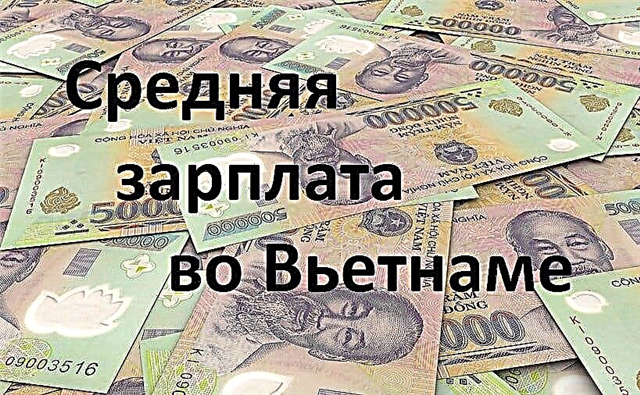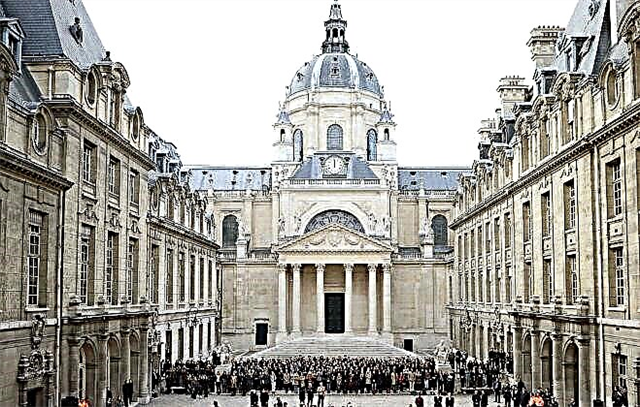One of the founders of the Parisian college for the poorest to study theology was Robert de Sorbonne. That is why the institution he created is better known abroad as the Sorbonne University. Over the centuries of its existence, the university has graduated more than one generation of the greatest scientists, philosophers and intellectuals. Today, this academic institution is renowned worldwide for educational opportunities in the arts, humanities, medicine, engineering, technology and management.

Briefly about the history and famous graduates of the Sorbonne
As a Parisian college, the current Sorbonne University was founded back in 1253. After 4 years, the institution received the official approval of King Louis IX and quickly became a popular institution of theology among the population.
The development of the college is very active, gradually the institution becomes the largest association for the study of literature and science in the capital of France. In 1968, the university was reorganized and divided into 13 separate universities, including the Sorbonne-Paris (Paris IV) and the University of Pierre and Marie Curie (UPMC - Paris VI), which since 2021 represent one multidisciplinary institution of the world level - the French Sorbonne University.
At different periods, the Sorbonne studied:
- the Italian poet Dante;
- the philosopher and theologian Thomas Aquinas, better known as Saint Thomas Aquinas;
- Honore de Balzac;
- Voltaire;
- Denis Diderot;
- John Calvin.
Among the teachers and staff of the university, Louis Pasteur, Antoine Lavoisier, Maria and Pierre Curie are known.
13 universities in Paris
As part of the University of Paris, 13 educational institutions currently function:
| Unofficial name in Russian | Official French name | Location, address | Main directions |
|---|---|---|---|
| Pantheon-Sorbonne | Université Paris 1 Panthéon-Sorbonne | V district, Pantheon square, 12, 75005 | economics, business, management |
| Pantheon-Assa | Université Paris 2 Panthéon-Assas | VI district | jurisprudence |
| New Sorbonne | Université Sorbonne Nouvelle Paris 3 | V district | cinematography, literature |
| Paris-Sorbonne | Lettres Sorbonne Université | V district, st. Victor Cousin, 1, 75005 | history, philosophy, literature. |
| Paris Descartes | Université Paris Descartes | V district, st. Ekol, 12, 75006 | law, medicine |
| Pierre and Marie Curie | Sorbonne Université | V district, st. Ekol, 21, 75006 | mathematics, physics, medicine |
| Paris Diderot | Université Paris Diderot | District XIII, st. Thomas Mann, 5, 75013 | medical, exact sciences, linguistics |
| Vincent Saint-Denis | Université Paris 8 Vincenes-Saint-Denis | st. de la Liberté, 2, 93526 Saint Denis | philosophy, history, art history |
| Dauphin | Université Paris Dauphine | 16th arrondissement square of Marshal Lattra de Tassigny, 75016 | economics and Management |
| Nanterre | Université Paris Nanterre | Republic avenue, 200, 92000, Nanterre | law, economics, philosophy |
| Paris-South (Sud) | Université Paris Sud | st. Georges Clemenceau, 15, 91400, Orsay | mathematical and physical |
| Val-de-Marne | Université Paris-Est Créteil Val de Marne | 61 General de Gaulle Ave., 94000, Creteil | law, philosophy, literature |
| Paris-North | Université Paris 13 | st. Jean Baptiste Clement, 99, 93430, Villetanese | law and political science |
Infrastructure of the University of Paris
 After a social crisis and a change of government in France in May 1968, 13 separately functioning educational institutions were formed from the once unified University of Paris:
After a social crisis and a change of government in France in May 1968, 13 separately functioning educational institutions were formed from the once unified University of Paris:
- University Paris-1 is the largest humanitarian university in France. He specializes mainly in three areas: economics and management, humanities and arts, jurisprudence and political science. Consists of 15 faculties and other educational units.
- University Paris-2 offers students training in the fields of law, jurisprudence, political science, economics, management, computer science. Includes the Institute of Journalism. It covers an area of more than 6 hectares and is located opposite the Luxembourg Gardens in the center of Paris.
- Paris-3 University consists of 13 faculties, where students study social and human sciences, languages, art, media. The buildings of the university are located in the Latin Quarter.
- The University of Paris-4, or Paris-Sorbonne, together with the University of Paris-6, named after the Curie physicists, since 2021 make up the unified state university of the Sorbonne. It includes 3 faculties, the main areas of which are: languages, humanities and social sciences, engineering and medicine. The general official website of the Sorbonne University can be found here.
- University Paris-5. Includes 8 faculties, 2 research institutes and dozens of laboratory units, covering all areas of the humanities and health. The educational units of the university are located both in Paris itself (Boulogne-Billancourt district) and in the suburban Montrouge.
- The University of Paris-7 is a higher educational institution, which presents specialties from a wide variety of sciences: natural, humanitarian, technical. The university buildings are located both in Paris itself and in the suburbs - the communes of Fontainebleau and Meudon.
- The University of Paris-8 mainly prepares students in the humanities, but also has faculties in computer science and law. The buildings are located 9 km north of Paris, in the commune of Saint-Denis.
- The University of Paris-9 specializes mainly in the socio-economic sciences. Since 2021, it has received worldwide recognition thanks to the EQUIS accreditation. It is located in the west of Paris - in the XVI arrondissement, occupying the building where the NATO headquarters was previously located.
- University Paris-10 is located in the suburb of the capital - the commune of Nanterre, not far from the largest business district of Europe, La Defense. It offers students a wide range of programs in the humanities and social sciences, economics, management, law, culture, art, sports.
- University Paris-11 - students from all over the world come here to study, aiming to obtain higher education in the field of exact sciences, especially physics and mathematics. Five faculties of the university, 83 research centers and hundreds of laboratories are grouped in the suburb of Paris - Orsay.
- The University of Paris-12 has 7 faculties, 4 institutes, 3 schools, 1 observatory and 32 research laboratories. This multidisciplinary institution teaches subjects from all areas of knowledge - more than 600 training courses in total.
- The University of Paris-13 is an interdisciplinary university, the largest center for academic and research activities. There are 5 faculties where you can study literature, law, economics, communications, medicine and biology.
Details of admission to the University of Paris
 Admission to universities in France begins at the age of 18. Admission for foreigners is possible for a bachelor's or master's degree. Usually, to enter the first year of a French university, you need to complete 1-2 courses of a Russian university, or at least have a certificate of passing the entrance exams.
Admission to universities in France begins at the age of 18. Admission for foreigners is possible for a bachelor's or master's degree. Usually, to enter the first year of a French university, you need to complete 1-2 courses of a Russian university, or at least have a certificate of passing the entrance exams.
For Russian students, the package of entrance documents looks like this:
- A certificate or diploma, which is translated into French (or English - upon admission to a fully English-language course) and certified by a notary. Nostrification, that is, confirmation of a diploma received in Russia, is not required to continue studying at a French university.
- Covering letter - a free-style explanation of the reasons why this particular university and a particular faculty were chosen by the applicant.
- An extract from the account of the applicant (or his sponsor) on the availability of sufficient funds for study for a year.
- Passport, birth certificate - their copies and notarized translation.
In addition to the listed documents, you may need a letter of recommendation, curriculum vitae, resume or other papers provided by a specific university, and depending on the specialty.
Exams for admission
There are no entrance examinations for the University of Paris, with the exception of some specialties.
However, foreigners must necessarily speak French at a high level. To confirm this, one of the language exams is passed - DALF (C1 level) or DELF (B2), then a certificate is provided to the admissions office.
If the curriculum is in English, a certificate of passing the IELTS or TOEFL exams will be required.
Prospective students in business or finance are required to pass the GMAT and GRE standardized analytical aptitude tests, and also submit the results to the admissions committee.
Sometimes an applicant may need to go through an interview, especially in the absence of a document confirming the passing of a language exam.
Sorbonne University Tuition Fees
 Since all Sorbonne universities are public, students can study there for free, only once a year by paying a registration fee. From autumn 2021, the fee for foreigners from countries outside the Eurozone will be:
Since all Sorbonne universities are public, students can study there for free, only once a year by paying a registration fee. From autumn 2021, the fee for foreigners from countries outside the Eurozone will be:
- 2,770 euros / year - undergraduate programs (licenses);
- 3,770 euros / year - master's programs;
- 3800 euros / year - doctoral studies (the same as for citizens of EU countries).
At the same time, the French government announced that the availability and number of scholarships for international students will also be increased. Additional information is available in this section of the Campus France website.
In terms of study programs, the Sorbonne University in Paris offers fast and long-term programs. The first lasts 2-3 years, the second - 5-7 years.
The educational process itself also has features:
- emphasis is placed on self-study of students;
- there is a possibility of individual drawing up of a work plan;
- a large number of practical and laboratory classes, while lectures and seminars are minimized;
- students conduct their own research, then prepare and defend projects on it.
Examinations are most often taken in writing, after the completion of lecture courses.
Take a sociological survey!
[yop_poll id = ”14 ″]
Cooperation of the University of Paris with Russian universities
Many of the universities in Paris cooperate with Russian universities, thanks to which students have the opportunity not only to learn from the experience of institutions in France and the Russian Federation, but even to receive two diplomas.
Double degree programs are available between:
- The National Research University Higher School of Economics (NRU-HSE) in Russia, the Moscow State Institute of International Relations (MGIMO) and the Universities Paris-1 and Paris-10;
- Moscow State University M.V. Lomonosov Moscow State University, French University College, St. Petersburg State University (SPbSU) and universities Paris-2, Paris-4, Paris-5, Paris-7, Paris-8.
Financial support for international students
Before worrying about the high cost of living and studying in Paris, you need to pay attention to the financial support that the universities of Paris, the state or private foundations offer to foreign students.
Grants and scholarships are available to both those who have been recognized for exceptional academic or research excellence and students with financial difficulties (if documented).
The most popular grants and scholarships for foreigners:
- Scholarships awarded by the Chancellery of the Sorbonne.
- Study Scholarships for Master's Students covering all study costs.
- Scholarship for Dual Degree Students - partly covers tuition costs.
- Students of 5-6 courses of medical specialties are offered financial assistance for an internship in one of the clinics in Paris.
- Funding for 3 years of postgraduate internships in international programs.
- Scholarship from the French Ministry of Foreign and European Affairs (EIFEL) to attract elite students from abroad (details on the Campus France website).
Benefits of Studying at the University of Paris
 With a Sorbonne diploma, finding a prestigious job in France or abroad will not be difficult. Due to the versatility of the university, you can study any specialty - from art history to law or mathematics.
With a Sorbonne diploma, finding a prestigious job in France or abroad will not be difficult. Due to the versatility of the university, you can study any specialty - from art history to law or mathematics.
However, the benefits of studying at the Sorbonne do not end there:
- admission without exams;
- most of the education costs are borne by the state;
- scholarships and grants for international students;
- benefits and discounts for students;
- the ability to travel around Europe.
The future student of the Sorbonne needs, however, to immediately understand that the work will have to be hard and a lot. Moreover, you will need to motivate and control yourself - this is one of the differences of the European education system.











